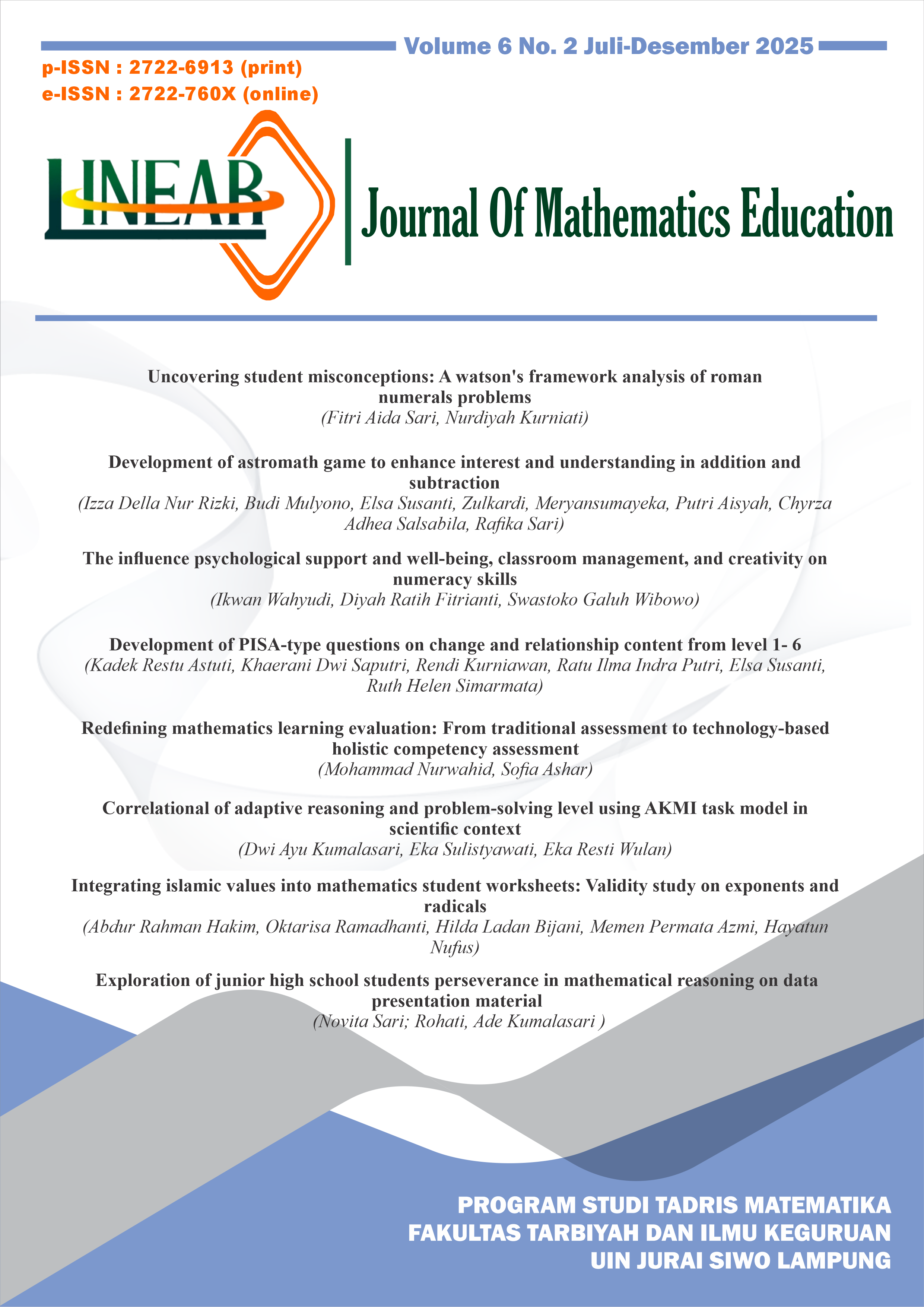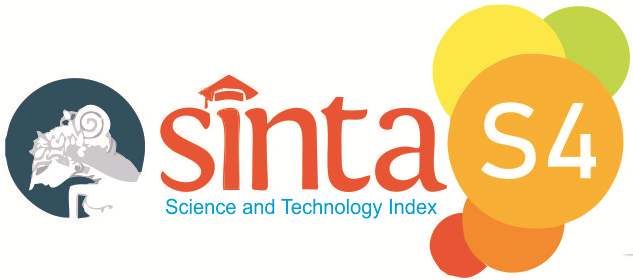The influence psychological support and well-being, classroom management, and creativity on numeracy skills
DOI:
https://doi.org/10.32332/nyhpfx70Keywords:
Classroom Management, Creativity, Numeracy, Psychological Support, Psychological Well-BeingAbstract
Numeracy skills are fundamental in mathematics education, yet assessment results continue to reveal areas for improvement. This study investigates the influence of psychological support, psychological well-being, classroom management, and creativity on students' numeracy skills. This study employs a quantitative research method. Data were collected through document analysis of the 2024 National Assessment Public Report for elementary schools and their equivalents. A total sample of 81,824 students was selected based on the availability of complete data on the examined variables. Data analysis was conducted using structural equation modeling with the SEM-PLS approach. The results indicate that all independent variables positively and significantly influence students' numeracy skills, with creativity exerting the most substantial effect and a coefficient of determination of 18.1%. Additionally, psychological well-being partially mediates the relationship between psychological support and numeracy skills. Therefore, a more holistic learning approach is needed to improve numeracy skills by considering psychosocial factors and the learning environment. Theoretically, the study supports the view that numeracy development is not solely cognitive but shaped by affective and contextual dimensions. Practically, it calls for policies and teaching practices that promote psychological well-being, creativity, and supportive learning environments in schools.
References
Assefa, M., Rao, D. Y. J., & Hailu, A. Y. (2020). Designing of accounting information system for small and medium enterprises: Application of PLS-SEM. International Journal of Sciences: Basic and Applied Research, 54(3), 124–139.
Bicer, A., Chamberlin, S., & Perihan, C. (2021). A Meta‐Analysis of the Relationship between Mathematics Achievement and Creativity. The Journal of Creative Behavior, 55(3), 569–590. https://doi.org/10.1002/jocb.474
Busari, I. O., Oladeji, A. F., & Sulaimon, T. O. (2023). Examining the Impact of Teachers’ Attitudes on College Students’ Attitudes in a Mathematics Classroom. Journal of Education and Practice, 14(9), 11–18. https://doi.org/10.7176/JEP/14-9-03
Cambay, D. J. D., & Paglinawan, J. L. (2024). Classroom Management Strategies and School Environment on Student Engagement. International Journal of Research and Innovation in Social Science, 8(12), 1–13. https://doi.org/10.47772/IJRISS.2024.8120001
Deda, Y. N., Disnawati, H., & Daniel, O. (2023). How Important of Students’ Literacy and Numeracy Skills in Facing 21st-Century Challenges: A Systematic Literature Review. Indonesian Journal of Educational Research and Review, 6(3), 563–572. https://doi.org/10.23887/ijerr.v6i3.62206
de-la-Peña, C., Fernádez-Cézar, R., & Solano-Pinto, N. (2021). Attitude Toward Mathematics of Future Teachers: How Important Are Creativity and Cognitive Flexibility? Frontiers in Psychology, 12, 713941. https://doi.org/10.3389/fpsyg.2021.713941
Erawati, N. K., & Adnyana, P. B. (2024). Implementation of Jean Piaget’s Theory of Constructivism in Learning: A Literature Review. Indonesian Journal of Educational Development (IJED), 5(3), 394–401. https://doi.org/10.59672/ijed.v5i3.4148
Grabel, B. F. (2017). The Relationship between Wellbeing and Academic Achievement: A Systematic Review. BMS.
Herman, K. C., Reinke, W. M., Dong, N., & Bradshaw, C. P. (2022). Can effective classroom behavior management increase student achievement in middle school? Findings from a group randomized trial. Journal of Educational Psychology, 114(1), 144–160. https://doi.org/10.1037/edu0000641
Hill, J. L., Kern, M. L., Seah (佘伟忠), W. T., & van Driel, J. (2021). Feeling Good and Functioning Well in Mathematics Education: Exploring Students’ Conceptions of Mathematical Well-Being and Values. ECNU Review of Education, 4(2), 349–375. https://doi.org/10.1177/2096531120928084
Holzer, J., Lüftenegger, M., Käser, U., Korlat, S., Pelikan, E., Schultze‐Krumbholz, A., Spiel, C., Wachs, S., & Schober, B. (2021). Students’ basic needs and well‐being during the COVID‐19 pandemic: A two‐country study of basic psychological need satisfaction, intrinsic learning motivation, positive emotion and the moderating role of self‐regulated learning. International Journal of Psychology, 56(6), 843–852. https://doi.org/10.1002/ijop.12763
Jian, X., Wijaya, T. T., & Yu, Q. (2022). Key Factors Affecting Mathematics Teachers’ Well-Being and Stress Levels: An Extended Engagement Theory. International Journal of Environmental Research and Public Health, 20(1), 548. https://doi.org/10.3390/ijerph20010548
Kusuma, D., Sukestiyarno, Y. L., Wardono, W., & Cahyono, A. N. (2021). The Characteristics of Mathematical Literacy Based on Students’ Executive Function. European Journal of Educational Research, 11(1), 193–206. https://doi.org/10.12973/eu-jer.11.1.193
Ling, X., Chen, J., Chow, D. H. K., Xu, W., & Li, Y. (2022). The “Trade-Off” of Student Well-Being and Academic Achievement: A Perspective of Multidimensional Student Well-Being. Frontiers in Psychology, 13, 772653. https://doi.org/10.3389/fpsyg.2022.772653
Marder, J., Thiel, F., & Göllner, R. (2023). Classroom management and students’ mathematics achievement: The role of students’ disruptive behavior and teacher classroom management. Learning and Instruction, 86, 101746. https://doi.org/10.1016/j.learninstruc.2023.101746
Molina-Muñoz, D., Contreras-García, J. M., & Molina-Portillo, E. (2023). Does the psychoemotional well-being of Spanish students influence their mathematical literacy? An evidence from PISA 2018. Frontiers in Psychology, 14, 1196529. https://doi.org/10.3389/fpsyg.2023.1196529
Niemi, K., Minkkinen, J., & Poikkeus, A.-M. (2024). Opening up learning environments: liking school among students in reformed learning spaces. Educational Review, 76(5), 1191–1208. https://doi.org/10.1080/00131911.2022.2098927
Nilimaa, J. (2023). New Examination Approach for Real-World Creativity and Problem-Solving Skills in Mathematics. Trends in Higher Education, 2(3), 477–495. https://doi.org/10.3390/higheredu2030028
Nurzulifa, S., & Dwijanto, D. (2021). Creative thinking mathematical ability of students in Treffinger learning based on cognitive style. Unnes Journal of Mathematics Education, 10(1), 52–61. https://doi.org/10.15294/ujme.v10i1.32402
Rakhmawati, Y., & Mustadi, A. (2022). The circumstances of literacy numeracy skill: Between notion and fact from elementary school students. Jurnal Prima Edukasia, 10(1), 9–18. https://doi.org/10.21831/jpe.v10i1.36427
Sa’dijah, C., Purnomo, H., Abdullah, A. H., Permadi, H., Anwar, L., Cahyowati, E. T. D., & Sa’diyah, M. (2023). Students’ numeracy skills in solving numeracy tasks: Analysis of students of junior high schools. AIP Conf. Proc., 040011. https://doi.org/10.1063/5.0113664
Sadoughi, M., & Hejazi, S. Y. (2023). The effect of teacher support on academic engagement: The serial mediation of learning experience and motivated learning behavior. Current Psychology, 42(22), 18858–18869. https://doi.org/10.1007/s12144-022-03045-7
Sudbury-Riley, L., FitzPatrick, M., & Schulz, P. J. (2017). Exploring the Measurement Properties of the eHealth Literacy Scale (eHEALS) Among Baby Boomers: A Multinational Test of Measurement Invariance. Journal of Medical Internet Research, 19(2), e53. https://doi.org/10.2196/jmir.5998
Tao, Y., Meng, Y., Gao, Z., & Yang, X. (2022). Perceived teacher support, student engagement, and academic achievement: a meta-analysis. Educational Psychology, 42(4), 401–420. https://doi.org/10.1080/01443410.2022.2033168
Yang, Y., Li, G., Su, Z., & Yuan, Y. (2021). Teacher’s Emotional Support and Math Performance: The Chain Mediating Effect of Academic Self-Efficacy and Math Behavioral Engagement. Frontiers in Psychology, 12, 651608. https://doi.org/10.3389/fpsyg.2021.651608
Zhuo, X., Wang, Y., Xu, Y., Feng, H., Liu, C., Wang, Y., & Si, J. (2025). How students’ math anxiety profiles change in primary school: The roles of teacher support, peer support and math attitudes. British Journal of Educational Psychology, 1–25. https://doi.org/10.1111/bjep.12758
Downloads
Published
Issue
Section
License
Copyright (c) 2025 Ikwan Wahyudi, Diyah Ratih Fitrianti, Swastoko Galuh Wibowo

This work is licensed under a Creative Commons Attribution-ShareAlike 4.0 International License.

















